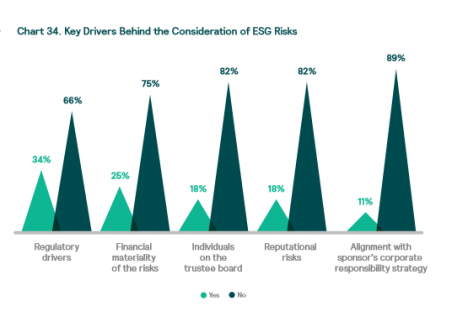The day that climate became mainstream
From the blog: Climate campaigners across the country spluttered into their morning cups of fair trade coffee last Tuesday as the Department for Work and Pensions and Financial Conduct Authority published their final responses to the Law Commission’s 2017 report on pensions and social investing.
Having kept its cards very close to its chest over the past few months, the FCA revealed that not only does it intend to require independent governance committees to report on financially material environmental, social and governance risks, including climate change, but it recognises that climate risk should be considered alongside mainstream investment risks such as inflation and liquidity risk.
One thing is for sure though, climate risk for UK pensions is no longer a mere ‘ethical’ concern
The small step of publishing this response is a giant leap forward in the approach of the UK’s biggest financial regulator. It leaves the door open for further rule changes for asset managers and other investors.
DWP joins the party
At the same time, the DWP has published draft amendments that will require trustees to explain how they take account of financially material ESG risks, including climate change, in the scheme’s statement of investment principles.
By linking back to financial materiality and being explicit on climate change, both regulators have proposed changes that are clearer on environmental risk and go further than the European Commission’s recent attempts to define ESG.
Source: Mercer
Mercer’s annual survey of European asset owners, also published last week, points to an interesting and suddenly more relevant trend – that it is in fact regulatory change, rather than the more frequently discussed financial or reputational risks, that is causing pension schemes to start considering ESG.
The European Commission’s recent flurry of proposals, following its Sustainable Financial Action Plan, is likely to have contributed to this (along with IORP II, of course).
Nowhere to hide for ESG sceptics
But the trend is clear and the old argument that fiduciary duty prevents trustees from raising climate change in meetings on investment strategy now seems as tired as the latest Brexit headline.
We will have to wait until next year to see if the gap between regulation and other key drivers for considering ESG continues to grow following the big changes the UK’s financial regulators are now starting to make.
One thing is for sure though, climate risk for UK pensions is no longer a mere ‘ethical’ concern.
Danielle Lawson is a lawyer at ClientEarth
Most Viewed
- What does Labour have in store for the pensions industry?
- LGPS latest: GLIL backers invest £475m for UK infrastructure push
- Dashboard costs rose by 23% in 2023, figures show
- Border to Coast launches UK strategy in major private markets push
- How the pensions industry can better support people with mental health problems


